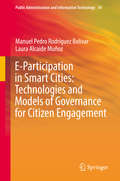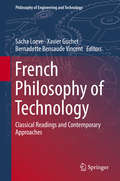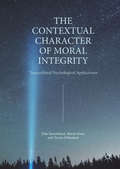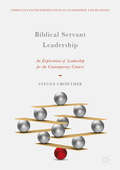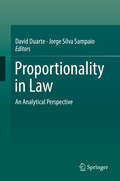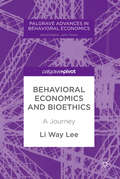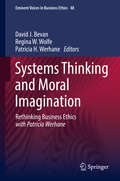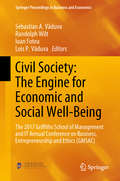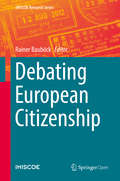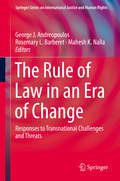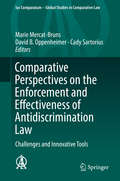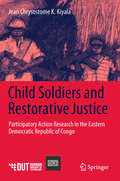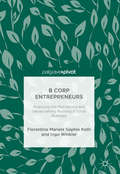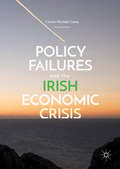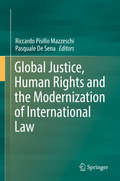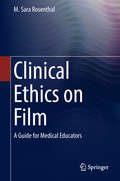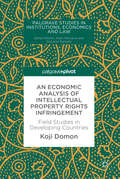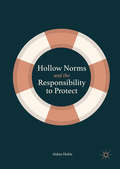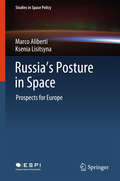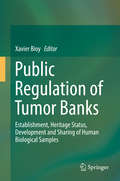- Table View
- List View
E-Participation in Smart Cities: Technologies and Models of Governance for Citizen Engagement (Public Administration and Information Technology #34)
by Manuel Pedro Rodríguez Bolívar Laura Alcaide MuñozThis book analyzes e-participation in smart cities. In recent decades, information and communication technologies (ICT) have played a key role in the democratic political and governance process by allowing easier interaction between governments and citizens, and the increased ability of citizens to participate in the production chain of public services. E-participation plays and important role in the development of smart cities and smart communities , but it has not yet been extensively studied. This book fills that gap by combining empirical and theoretical research to analyze actual practices of citizen involvement in smart cities and build a solid framework for successful e-participation in smart cities. The book is divided into three parts. Part I discusses smart technologies and their role in improving e-participation in smart cities. Part II deals with models of e-participation in smart cities and the organization issues affecting the implementation of e-participation; these chapters analyze the efficiency of governance models in relation to the establishment of smart cities. Part III proposes incentives to motivate increased participation by governments and cititzenry within the smart cities context. Written by an international panel of experts and practitioners, this book will be a convenient source of information on e-participation in smart cities and will be valuable to academics, researchers, policy-makers, public managers, citizens, international organizations and anyone who has a stake in enhancing citizen engagement in smart cities.
Information and Communications Security: 17th International Conference, Icics 2015, Beijing, China, December 9-11, 2015, Revised Selected Papers (Lecture Notes In Computer Science #9543)
by Sihan Qing Chris Mitchell Liqun Chen Dongmei LiuThis book constitutes the refereed proceedings of the 19th International Conference on Information and Communications Security, ICICS 2017, held in Beijing, China, in December 2017. The 43 revised full papers and 14 short papers presented were carefully selected from 188 submissions. The papers cover topics such as Formal Analysis and Randomness Test; Signature Scheme and Key Management; Algorithms; Applied Cryptography; Attacks and Attacks Defense; Wireless Sensor Network Security; Security Applications; Malicious Code Defense and Mobile Security; IoT Security; Healthcare and Industrial Control System Security; Privacy Protection; Engineering Issues of Crypto; Cloud and E-commerce Security; Security Protocols; Network Security.
French Philosophy of Technology: Classical Readings And Contemporary Approaches (Philosophy Of Engineering And Technology Ser. #29)
by Bernadette Bensaude Vincent Xavier Guchet Sacha LoeveOffering an overall insight into the French tradition of philosophy of technology, this volume is meant to make French-speaking contributions more accessible to the international philosophical community. The first section, “Negotiating a Cultural Heritage,” presents a number of leading 20th century philosophical figures (from Bergson and Canguilhem to Simondon, Dagognet or Ellul) and intellectual movements (from Personalism to French Cybernetics and political ecology) that help shape philosophy of technology in the Francophone area, and feed into contemporary debates (ecology of technology, politics of technology, game studies). The second section, “Coining and Reconfiguring Technoscience,” traces the genealogy of this controversial concept and discusses its meanings and relevance. A third section, “Revisiting Anthropological Categories,” focuses on the relationships of technology with the natural and the human worlds from various perspectives that include anthropotechnology, Anthropocene, technological and vital norms and temporalities. The final section, “Innovating in Ethics, Design and Aesthetics,” brings together contributions that draw on various French traditions to afford fresh insights on ethics of technology, philosophy of design, techno-aesthetics and digital studies. The contributions in this volume are vivid and rich in original approaches that can spur exchanges and debates with other philosophical traditions.
The Contextual Character of Moral Integrity: Transcultural Psychological Applications
by Dita Šamánková Marek Preiss Tereza PříhodováThis book discusses outcomes of a study by the National Institute of Mental Health, Czech Republic, examining moral integrity in the post-communist Czech-speaking environment. Chapters map the history of the Euro-Atlantic ethical disciplines from moral philosophy and psychology to evolutionary neuroscience and socio-biology. The authors emphasize the biological and social conditionality of ethics and call for greater differentiation of both research and applied psychological standards in today’s globalised world. Using a non-European ethical system – Theravada Buddhism – as a case study, the authors explore the differences in English and Czech interpretations of the religion. They analyse cognitive styles and language as central variables in formatting and interpreting moral values, with important consequences for cultural transferability of psychological instruments. This book will appeal to academics and other specialists in psychology, psychiatry, sociology and related fields, as well as to readers interested in the psychology of ethics.
Biblical Servant Leadership: An Exploration of Leadership for the Contemporary Context (Christian Faith Perspectives in Leadership and Business)
by Steven CrowtherThis book explores the concepts from Scripture for Servant leadership and compare these findings with contemporary models of servant leadership. It is an examination of Christian leadership for the contemporary world in its global and increasing secular context. Leadership studies typically view leadership externally from the results. This is a good beginning but leadership needs to also view the inside of leadership in the person of the leader. Scripture is uniquely qualified in this area since its first concern is the person who leads not just in leadership behaviors. The author uses examples from both the Old and New Testament to establish a new shepherd model of leadership that moves beyond the servant mode to the mode of caring direction. This model will provide scholars and researchers as well as leaders themselves with a way of leading that overcomes negative forms of leadership which lead to failure.
Proportionality in Law: An Analytical Perspective
by David Duarte Jorge Silva SampaioThis book addresses the principle of proportionality, which is currently one of the most important instruments of judicial review, from both analytical and theory of law perspectives. As such, the analysis provided is far more comprehensive and can be applied to all areas of law, not just constitutional law. On the one hand, the volume offers a broad perspective on several aspects related to proportionality, such as its structure, the balancing methodology and the distinction between rules and principles. On the other, it provides an innovative, normativist and analytical approach to proportionality, helping readers understand its structure and behaviour.
Behavioral Economics and Bioethics: A Journey (Palgrave Advances In Behavioral Economics Ser.)
by Li Way LeeThis book takes readers on a journey through the wide universe of bioethics, raising the following question: what is the proper attitude towards health, life, and death from the perspective of contemporary behavioral economics? Drawing on fields as diverse as economics, ethics, ecology, biology, and philosophy, this book seeks to uncover the bioethics we accomplish, not the moral principles that we advocate. This book covers life-and-death issues arranged around five themes: selves, persons, populations, species, and “Future Earth”. Ultimately, the author illustrates two kinds of justice: static and dynamic. Static justice prevails whenever parties are free to bargain with each other, while dynamic justice follows from parties' interactions over time. An examination into these types of justice reveals one particularly striking phenomenon: attempts by others to tip the balance of justice have a tendency to backfire. Of primary interest to behavioral economists, this book will also appeal to scholars studying bioethics, ecology, medicine, and philosophy, as well as all people dealing with issues of health, dying, and death.
Systems Thinking and Moral Imagination: Rethinking Business Ethics With Patricia Werhane (Issues in Business Ethics #48)
by Patricia H. Werhane David J. Bevan Regina W. WolfeThis volume brings together a selection of papers written by Patricia Werhane during the most recent quarter century. The book critically explicates the direction and development of Werhane’s thinking based on her erudite and eclectic sampling of orthodox philosophical theories. It starts out with an introductory chapter setting Werhane’s work in the context of the development of Business Ethics theory and practice, along with an illustrative time line. Next, it discusses possible interpretations of the papers that have been divided across a range of themes, and examines Werhane’s contribution to these thematic areas. <P><P> Patricia H. Werhane is a renowned author and innovator at the intersection of philosophy and Applied Business Ethics. She is professor emerita and a senior fellow at the Olsson Centre for Applied Ethics at Darden and was formerly the Ruffin Professor of Business Ethics. She is also professor emerita at DePaul University, where she was Wicklander Chair in Business Ethics and director of the Institute for Business and Professional Ethics. <P><P> A prolific author whose works include Moral Imagination and Management Decision-Making and Organization Ethics for Health Care, Werhane is an acclaimed authority on employee rights in the workplace, one of the leading scholars on Adam Smith and founder and former editor-in-chief of Business Ethics Quarterly, the leading journal of Business Ethics. She was a founding member and past president of the Society for Business Ethics and, in 2001, was elected to the executive committee of the Association for Practical and Professional Ethics. Before joining the Darden faculty in 1993, Werhane served on the faculty of Loyola University Chicago and was a Rockefeller Fellow at Dartmouth College and Senior Fellow at Cambridge University.
Civil Society: The 2017 Griffiths School of Management and IT Annual Conference on Business, Entrepreneurship and Ethics (GMSAC) (Springer Proceedings in Business and Economics)
by Sebastian A. Văduva Randolph Wilt Ioan Fotea Lois P. VăduvaThis proceedings volume explores the concept of civil society as an engine for economic and social well-being. Featuring contributions from the 2017 Griffiths School of Management and IT Annual Conference on Business, Entrepreneurship and Ethics (GMSAC) held in Oradea, Romania, this volume provides different perspectives, emerging studies and trends that are crucial to the further understanding of the interconnection of civil society, economic development and social stability. The enclosed contributions address key topics such as a) the ways in which national, regional and local governments are best equipped to support economic and social development, b) how government, business and non-profit sectors can support economic and social stability and c) the ways in which growing economies’ active societies can strengthen civil society. Research and practice have proven that there is a great potential for civil society organizations to support socio-economic well-being, both directly and indirectly. As a result, the interplay between civil society, economics and social well-being is highly relevant to current business and economic research and is a topic of discussion by academics and practitioners in the government, business and non-profit sectors. This volume showcases some of the current research, cases and discussions in this area from an interdisciplinary, global perspective. Featuring contributions exploring timely subjects such as consumer behavior, the hospitality industry, education, corporate social responsibility (CSR), banking, health care, and semiotics, this book is appropriate for researchers, academics and policy makers in economic and social development, business ethics and sustainability.
Debating European Citizenship (IMISCOE Research Series)
by Rainer BauböckThis open access book raises crucial questions about the citizenship of the European Union. Is it a new citizenship beyond the nation-state although it is derived from Member State nationality? Who should get it? What rights and duties does it entail? Should EU citizens living in other Member States be able to vote there in national elections? If there are tensions between free movement and social rights, which should take priority? And should the European Court of Justice determine what European citizenship is about or the legislative institutions of the EU or national parliaments? This book collects a wide range of answers to these questions from legal scholars, political scientists, and political practitioners. It is structured as a series of three conversations in which authors respond to each other. This exchange of arguments provides unique depth to the debate.
The Rule of Law in an Era of Change: Responses to Transnational Challenges and Threats (Springer Series on International Justice and Human Rights)
by George J. Andreopoulos Rosemary L. Barberet Mahesh K. NallaThis forward-thinking volume examines the rule of law from a global perspective, in the context of a growing array of transnational challenges and threats As the United Nations (UN) notes, the rule of law constitutes the basis “on which fair and just societies are built.” The contributions to this volume provide insights to several emerging debates about what the rule of law means in the modern era of warfare and of massive and systematic human rights violations that call for robust and transparent accountability mechanisms and processes. The authors of this work examine several controversial topics, including: -The growing use of drones, and the morality of long distance use -The UN Security Council’s evolving counterterrorism policies and practices -Victims’ Rights and the effort to provide meaning and justice to victims and survivors of terrorism - The relationship between the International Criminal Court (ICC) and Truth and Reconciliation Commissions (TRCs) -The effectiveness of the international criminal justice process overall, with an eye to procedural fairness and justice. This timely work will be of interest to researchers in criminal justice, particularly with a focus on counter-terrorism and international justice, as well as international law, human rights, and international studies.
Comparative Perspectives on the Enforcement and Effectiveness of Antidiscrimination Law: Challenges and Innovative Tools (Ius Comparatum - Global Studies in Comparative Law #28)
by Marie Mercat-Bruns David B. Oppenheimer Cady SartoriusThis book focuses on anti-discrimination law in order to identify commonalities and best practices across nations. Almost every nation in the world embraces the principle of equality and non-discrimination, in theory if not in practice. As the authors' expert contributions establish, the sources of the principle vary considerably, from international treaties to religious law, traditions and more. There are many approaches to methods of enforcement and other variables, but the principle is nearly universal. What does a comparison of the laws and approaches across different lands reveal? Readers may explore the enforcement and effectiveness of anti-discrimination law from 25 nations, across six continents. Esteemed authors examine national, regional and international systems looking for common and best practices, identifying innovative approaches to long-standing problems. The many ways that anti-discrimination law is enforced are brought to light, from criminal or civil prosecution through to community resolution processes, amongst others. Through comparing the approaches of different lands, the authors consider which methods of enforcement are effective. These enriching national and international perspectives highlight the need for more creative, concrete and coordinated means of enforcement to ensure the effectiveness of anti-discrimination law, regardless of the legal tradition concerned, but in light of these traditions. Readers will find each nation remarkable, and learn something new and interesting from each report.
Child Soldiers and Restorative Justice: Participatory Action Research in the Eastern Democratic Republic of Congo
by Jean Chrysostome KiyalaThis book investigates how, while children used as soldiers are primarily perceived as victims of offences against international law, they also commit war atrocities. In the aftermath of armed conflict, the mainstream justice system targets warlords internationally, armed groups and militias’ commanders who abduct and enrol children as combatants, leaving child perpetrators not being held accountable for their alleged gross human rights violations. Attempts to prosecute child soldiers through the mainstream justice system have resulted in child rights abuses. Where no accountability measures have been taken, demobilised young soldiers have experienced rejection, and eventually, some have returned to soldiering. This research provides evidence of the potential of restorative justice peacemaking circles and locally-based jurisprudence – specifically the Baraza - to hold former child soldiers accountable and facilitate their reintegration into society.
B Corp Entrepreneurs: Analysing the Motivations and Values behind Running a Social Business
by Florentine Mariele Roth Ingo WinklerHighlighting the motivations of B Corp entrepreneurs in Chile, this book explores the phenomenon behind for-profit organisations that are committed to social and ecological sustainability as well as human welfare. By examining the personal and social drivers of businesses which are not solely focused on profit-making, the authors reveal a dual orientation that is an important factor in the creation of hybrid organisations. Offering an in-depth study of B Corp entrepreneurs in Chile, the largest B Corp community outside of North America, this pioneering book challenges dominant assumptions that there is only one ideal type of entrepreneur and argues that the values of the purely profit-driven and purely social-driven do in fact intersect. An enlightening read for researchers of social business and sustainability, this book analyses perceptions towards success, and the desire to solve environmental problems, underlining a fundamental aspect of the entrepreneur’s personal value structure.
Policy Failures and the Irish Economic Crisis
by Ciarán Michael CaseyThis book seeks to understand why almost all commentators on the Irish economy were unprepared for the scale of the recent economic crisis. It analyses the public contributions from a broad range of observers, including domestic and international agencies, academics, the newspapers and politicians. This approach gives new insights into the analytical and institutional shortfalls that inhibited observers from recognising the degree of the risk. The book demonstrates that most commentators were either impeded in what they could say, or else lacked the expertise to challenge the prevailing view. The findings have significant implications for a broad range of institutions, particularly the media and the Oireachtas (the Irish Parliament).
Global Justice, Human Rights and the Modernization of International Law
by Riccardo Pisillo Mazzeschi Pasquale De SenaThis book is based on the observation that international law is undergoing a process of change and modernization, driven by many factors, among which the affirmation and consolidation of the role of the individual and of the theory of human rights stand out. In the contemporary world, international law has demonstrated an ability to evolve rapidly. But it is still unclear whether its modernization process is also producing structural changes, which affect the subjects, the sources and even the very purpose of this law. Is it truly possible to speak of a paradigmatic and ideological change in the international legal system, one that also involves a transition from a state-centred international order to a human-centred one, and from inter-state justice to global justice?The book addresses three fundamental aspects of the modernization process of international law: the possible widening of the concept of international community and of the classic assumptions of statehood; the possible diversification of the sources of general international law; and the ability of international law to adapt to new challenges and to achieve the main goals for humanity set by the United Nations.The overall objective of the book is to provide the tools for a deeper understanding of the transition phase of contemporary international law, by examining the major problems that characterize this phase. The book will also stimulate critical reflection on the future prospects of international law.
Regulating Investor Protection under EU Law: The Unbridgeable Gaps with the U.S. and the Way Forward
by Antonio MarcacciThis book analyzes the legal system for the protection of retail investors under the European Union law of investment services. It identifies the regulatory leitmotiv driving the EU lawmaker and ascertains whether and to what extent such a system is self-sufficient, using a set of EU-made and EU-enforced rules that is essentially different and autonomous from the domestic legal orders. In this regard, the book takes a double perspective: comparative and intra-firm. Given the federal dimension of the US legal system and, thus, the “role-model” it plays vis-à-vis the EU, the book compares the two systems. To fully highlight the existing gaps and measure how self-sufficient the EU system is against its American counterpart, the Union/Federal level as such is analyzed – i.e., detached from the national (in EU terms) and State (in US terms) level. Regulating Investor Protection under EU Law also showcases the unique intra-firm perspective from a European investment firm and analyzes how EU-produced public-law rules become a set of compliance requirements for investment services providers. This “within-the-firm” angle gauges the self-sufficiency of the EU system of retail investor protection from the standpoint of an EU-regulated entity. The book is intended for both compliance professionals and academic scholars interested in this topic while also including illustrative sections intended to provide a broader regulatory view for less-experienced readers.
Space Security and Legal Aspects of Active Debris Removal (Studies in Space Policy #16)
by Annette FroehlichThe book analyzes the various legal and political concepts to resolve the problem of the existing space debris in outer space and which measures have been taken to avoid space debris or to reduce potential space debris in the course of future space missions. From a scientific and technical point of view various studies are ongoing to analyze the feasibility of active debris removal. Nevertheless it has to be highlighted that outer space is an international area where various actors with different legal and political concepts are operating, a situation that leads to different approaches concerning such activities.
Cruel, Inhuman or Degrading Treatment?: Benefit Sanctions in the UK (Palgrave Socio-Legal Studies)
by Michael AdlerThe book subjects the largely hidden phenomenon of benefit sanctions in the UK to sustained examination and critique. It comprises twelve chapters dealing with the terms ‘cruel’, ‘inhuman’ and ‘degrading’ that are used as a benchmark for assessing benefit sanctions; benefit sanctions as a matter of public concern; the historical development of benefit sanctions in the UK; changes in the scope and severity of benefit sanctions; conditionality and the changing relationship between the citizen and the state; the impact and effectiveness of benefit sanctions; benefit sanctions and administrative justice; the role of law in protecting the right to a social minimum; a comparison of benefit sanctions with court fines; benefit sanctions and the rule of law; and what, if anything, can be done about benefit sanctions. Each chapter ends with a paragraph that attempts to highlight the most salient points in that chapter, and the book ends with a short conclusion in which benefit sanctions are assessed against the chosen benchmark.
Clinical Ethics on Film: A Guide for Medical Educators
by M. Sara RosenthalThis book discusses feature films that enrich our understanding of doctor-patient dilemmas. The book comprises general clinical ethics themes and principles and is written in accessible language. Each theme is discussed and illuminated in chapters devoted to a particular film. Chapters start with a discussion of the film itself, which shares details behind the making of the film; critical reception; casting and other facts about production. The chapter situates the film in a history of medicine and medical sociology context, analyzes ethical issues raised in the film from a clinical ethics lens, and explains to readers how to use each film as a teaching aid for clinical ethics. Readers will understand how each film in this collection served to bring particular clinical ethics issues to the public’s attention, or reflected medico-legal issues that were part of the public discourse. The book is a perfect instructor's guide for anyone teaching bioethics, healthcare ethics, medical sociology, medical history, healthcare systems narrative medicine, or nursing ethics.
An Economic Analysis of Intellectual Property Rights Infringement: Field Studies in Developing Countries (Palgrave Studies in Institutions, Economics and Law)
by Koji DomonUsing unique field research from across Asia, this book examines the real markets of illicit products that breach intellectual property rights (IPR). The text presents three case studies regarding IPR infringements: unauthorised music content; fake spare parts of motorcycles; and fake Japanese food. Each study has unique characteristics, though their general concepts and problems have similar roots. The book shows what is happening in the black market and systems of illicit trade, providing information for stakeholders in Intellectual Property Rights to consider in devising effective methods for minimizing profits lost to copied and fake products.
Hollow Norms and the Responsibility to Protect
by Aidan HehirThis book explains why there is a pronounced disjuncture between R2P's habitual invocation and its actual influence, and why it will not make the transformative progress its proponents claim. Rather than disputing that R2P is a norm, or declaring that norms are insignificant, Hehir engages with post-positivist constructivist accounts on the role of norms to demonstrate first, that the efficacy of a norm is not directly related to the extent to which it is proliferated or invoked, and second, that in the post-institutionalization phase, norms undergo both contestation and (potentially regressive) reinterpretation. This volume analyses the evolution of R2P, and demonstrates that it has been steadily circumscribed and co-opted, so that today it has no power to meaningfully influence the behaviour of states. It is essential reading for academic audiences in the disciplines of International Relations and International Law.
Russia's Posture in Space: Prospects for Europe (Studies in Space Policy #18)
by Marco Aliberti Ksenia LisitsynaThe book sheds new lights on the evolution of Russian space activities with a focus on their strategy of international cooperation. This analysis is carried out in relation to the evolution of the domestic and international dynamics that have been impacting the country’s direction in space, with the ultimate goal of providing an assessment on their impact for current and foreseeable Europe-Russia space relations. Russia has traditionally been one of the two main strategic partners for Europe in its space endeavor. Hitherto, long-standing cooperation has been nurtured between the two actors in various areas, from scientific research to space transportation and human spaceflight. In recent years, however, a number of endogenous and exogenous developments has triggered significant changes in Russia’s space posture. These changes are evident in the adjustment of Russia’s space policies and programmatic goals, in the restructuring of the domestic space industry as well as in the attitude towards international space partnerships.
Public Regulation of Tumor Banks: Establishment, Heritage Status, Development and Sharing of Human Biological Samples
by Xavier BioyThe multidisciplinary book assesses the legal and economic uncertainties surrounding the collection, storage, provision and economic development of biological samples (tumors, tissues, cells) and associated personal data related to oncology. Public, partly public and private sector actors in the field of cancer care and research hold collections supported by significant public and social funding. Under certain conditions, particularly in the context of networking (sometimes promoted by public authorities), these collections can also represent major economic assets and scientific resources. However, this involves a number of issues and institutional constraints: legal: the will of the source person; non-pecuniary damage; freedom to establish collections; competence in deciding on their use; legal frameworks for their distribution; desire for return on investment for public institutions, notably in terms of industrial and intellectual property.economic: cost of establishing and running biological resource centres; destroying resources; emerging markets; profit sharing.public health policy choices: prioritisation of therapeutic measures over research (fundamental or clinical trials); conservation of resources; promotion of scientific (and not commercial) value of collections. The establishment, heritage recognition (“patrimonialisation”), development and sharing of these resources thus merit our calling into question present practices and their evolution, as well as the leverage available to public authorities (incentives, legislation, regulation) in a context where norms emerge from professional practice to become widely used in collaborative networks. Filling a gap in the current literature on law and economics, which pays little heed to these specific considerations, this book explores these considerations to bring to light the economic implications of ethical choices and governance issues in the health sector (structural organisation of local, national and European actors in oncology). It is intended for researchers in fields such as law, economics and biomedical sciences, as well as for public policymakers.
Mexican Natural Resources Management and Biodiversity Conservation: Recent Case Studies
by Alfredo Ortega-RubioThis book presents valuable and recent lessons learned regarding the links between natural resources management, from a Socio-Ecological perspective, and the biodiversity conservation in Mexico. It address the political and social aspects, as well as the biological and ecological factors, involved in natural resources management and their impacts on biodiversity conservation. It is a useful resource for researchers and professionals around the globe, but especially those in Latin American countries, which are grappling with the same Bio-Cultural heritage conservation issues.
